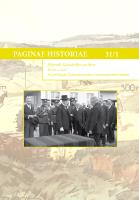Церковь и ЧСР: от кризиса к Модус вивенди (на примере греко- католиков Подкарпатской Руси)
The Church and Czechoslovakia: from Crisis to Modus Vivendi (on the example of the Greek Catholics of Subcarpathian Rus)
Author(s): Viktor Vasilovič KicheraSubject(s): History, Theology and Religion, Interwar Period (1920 - 1939), History of Religion
Published by: Národní archiv
Keywords: Greek Catholic Church; church politics; state-church relations; papacy
Summary/Abstract: In the interwar period, the state policy of Czechoslovakia “Away from Rome” complicated relations not only with the Catholic Church as a whole, but also with the Mukachevo Greek Catholic diocese in Subcarpathian Rus. This was manifested in a bias towards the clergy, interference in the traditional life of the Church, church schools; limiting the funding of church institutions and the like. On the one hand, the authorities of the Czechoslovak Socialist Republic really tried to streamline inter-confessional relations, ensuring the equality of all communities, but sometimes this contributed to the aggravation of inter-confessional disputes. Subsequently, there is a compromise and concessions on both sides both at the state level and in the regional dimension between the Greek Catholic Church and state officials in Subcarpathian Rus. The agreement was consolidated by the restoration of relations after the signing of Modus vivendi in 1928 between the Apostolic See and the Czechoslovak government (Cardinal P. Gaspari and E. Beneš), which also had regional significance, although there were exceptions - the development of the Orthodox movement, the issue of congrois and in-kind payments to the clergy and others similar.
Journal: Paginae Historiae
- Issue Year: 31/2023
- Issue No: 1
- Page Range: 385-394
- Page Count: 10
- Language: Russian

